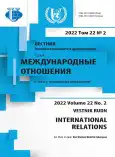Technology Policy and Sustainable Development in Nigeria
- Authors: Oghuvbu E.A.1, Gberevbie D.E.1, Oni S.O.1
-
Affiliations:
- Covenant University
- Issue: Vol 22, No 2 (2022): Non-Western World in Cyberspace
- Pages: 385-396
- Section: INTERNATIONAL ECONOMIC RELATIONS
- URL: https://journal-vniispk.ru/2313-0660/article/view/320550
- DOI: https://doi.org/10.22363/2313-0660-2022-22-2-385-396
- ID: 320550
Cite item
Full Text
Abstract
In the 21st century, the government and people of Nigeria are placing special emphasis on the technological component of development. In today’s world, technology has a critical impact on people and all areas of societal development, from communications and transport to construction and health care. In this study, the term “technology” is used in a broad context, referring to the knowledge, competencies and skills strongly required for technological development. Methodologically, the research is based on the secondary sources - monographs, academic articles and Internet resources. The main idea of the research is to comprehensively analyze the Nigeria’s technology and sustainable development policies. The performance of these efforts has been rather poor, preventing Nigeria from reaching a technological level comparable with that of developed economies. Rich in mineral resources Nigeria must initiate the development and adoption of modern technology to accelerate its economic growth. A review of Nigeria’s technology policy in the context of a long-term development is required. With a more thorough approach to the development of production functions and operations, such as quality control, maintenance, planning, etc., the level of national development would be much higher than at present. In the case of Nigeria, qualitative improvements in industrial production are directly linked to such factors as knowledge, expertise and experience. Overall, the authors conclude that vocational training for the sub-Saharan Africa sub-region is the key to bringing the respective countries to a new level of technological development. Meanwhile, in seeking technology, Nigeria must strive to strike a balance between industrial development and the environment in order to achieve sustainability.
Keywords
About the authors
Ejiroghene A. Oghuvbu
Covenant University
Email: augustine.oghuvbupgs@stu.cu.edu.ng
ORCID iD: 0000-0003-1422-3806
PhD Student, Department of Political Science and International Relations
Ota, NigeriaDaniel E. Gberevbie
Covenant University
Email: daniel.gberevbie@covenantuniversity.edu.ng
ORCID iD: 0000-0002-3958-2699
PhD, Professor, Department of Political Science and International Relations, College of Leadership Development Studies
Ota, NigeriaSamuel O. Oni
Covenant University
Author for correspondence.
Email: Samuel.oni@covenantuniversity.edu.ng
ORCID iD: 0000-0003-3513-0844
PhD, Associate Professor, Department of Political Science and International Relations, College of Leadership Development Studies
Ota, NigeriaReferences
- Adubifa, A. (1990). Technology policy in Nigeria. Ibadan: NISER Publications.
- Biggs, T., Shah, M., & Srivastava, P. (1995). Technological capability and learning in Africa enterprises. Washington, DC: The World Bank.
- Dibie, R. (1997). Business - government relations and technology development in Nigeria. Journal of Developing Societies, 13(2), 195-207.
- Eckardt, M. (2014). The impact of ICT on policies, politics and polities: An evolutionary economics approach to information and communication technologies. Andrassy Working Paper Series, (32), 1-19. Retrieved from https://www.andrassyuni.eu/pubfile/de-223-awp32eckardtfinal.pdf
- Gray, S. L. (2017). The social construction of time in contemporary education: implications for technology, equality and Bernstein’s ‘conditions for democracy’. British Journal of Sociology of Education, 38(1), 60-71. https://doi.org/10.1080/01425692.2016.1234366
- Huang, Y. (2021). Technology innovation and sustainability: Challenges and research needs. Clean Technologies and Environmental Policy, 23, 1663-1664. https://doi.org/10.1007/s10098-021-02152-6
- Ihonvbere, J. O. (1994). Nigeria: The politics of adjustment and democracy. New Brunswick: Transaction Publishers.
- Knapper, C. (2016). Does educational development matter? International Journal for Academic Development, 21(2), 105-115. https://doi.org/10.1080/1360144X.2016.1170098
- Lall, S, Navaretti, G. B., Teitel, S., & Wignaraja, G. (1994). Technology and enterprise development: Ghana under structural adjustment. London: Palgrave Macmillan. https://doi.org/10.1007/978-1-349-13925-5
- Lall, S. (Ed.). (1999). The technological response to import liberalization in Sub-Saharan Africa. London: Palgrave Macmillan.
- Lall, S., & Wangwe, S. (1998). Industrial policy and industrialization in Sub-Saharan Africa. Journal of African Economics, 7(1), 70-107. https://doi.org/10.1093/jafeco/7.suppl_1.70
- Lawal, T. & Oluwatoyin, A. (2011). National development in Nigeria: Issues, challenges and prospects. Journal of Public Administration and Policy Research, 3(9), 237-241.
- Lipumba, N. H. I. (1994). Africa beyond adjustment. Washington, DC: Overseas Development Council Series.
- Marais, R.; Grobbelaar, S. S., & De Kock, I. H. (2021). Healthcare technology transfer in Sub-Saharan Africa: Conceptual framework evaluation. IEEE-Transactions on Engineering Management, 1-17. https://doi.org/10.1109/TEM.2021.3109445
- Mukoro, A. (2019). Public administration: Practice and theory in Nigeria. Ibadan: Ababa Press Ltd.
- Mukoro, A. (2020). Administration of the public service. Ibadan: Ababa Press Ltd.
- Niebel, T. (2018). ICT and economic growth: Comparing developing, emerging and developed countries. World Development, 104, 197-211. https://doi.org/10.1016/j.worlddev.2017.11.024
- Ofori, G. (1994). Construction industry development: Role of technology transfer. Construction Management and Economics, 12(5), 379-392. https://doi.org/10.1080/01446199400000049
- Oladipo, O. D., & Grobler, W. (2020). Information and communication technology penetration level as an impetus for economic growth and development in Africa. Economic Research - Ekonomska Istraživanja, 33(1), 1394-1418. https://doi.org/10.1080/1331677X.2020.1745661
- Oviawe, J. I. (2017). Fostering students’ enrolment in technical education programmes through career guidance and occupational awareness. Education Journal, 6(4), 125-132. https://doi.org/10.11648/j.edu.20170604.11
- Soares, A. M., Kovaleski, J., Gaia, S., & Chiroli, D. M. (2020). Building sustainable development through technology transfer offices: An approach based on levels of maturity. Sustainability, 12(5), 1-22. https://doi.org/10.3390/su12051795
- Udo, G. J., & Edoho, F. M. (2000). Information technology transfer to African nations: An economic development mandate. Journal of Technology Transfer, 25, 329-342. https://doi.org/10.1023/A:1007886908690
- Wangwe, S. M. (Ed.). (1995). Exporting Africa: Technology, trade and industrialization in Sub-Saharan Africa. London: Routledge.
- Woyo, E., Rukanda, G. D., & Nyamapanda, Z. (2020). ICT policy implementation in higher education in Namibia: A survey of students’ perceptions. Education and Information Technologies, 25(5), 3705-3722. https://doi.org/10.1007/s10639-020-10118-2
- Yekini, N. A. (2014). Information communication technology: Concepts and application. Lagos: Hasfem Publishers.
Supplementary files









